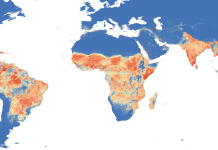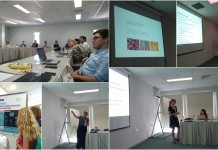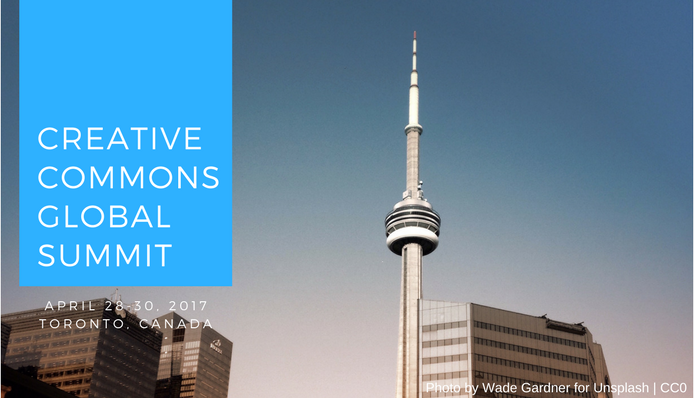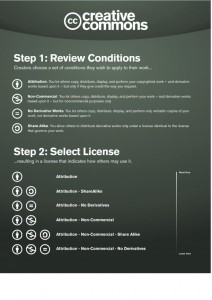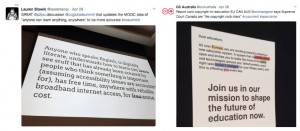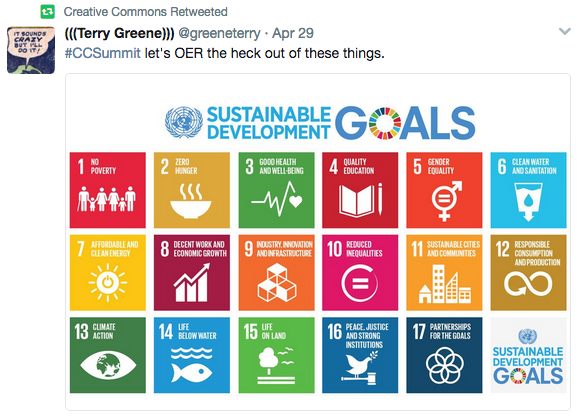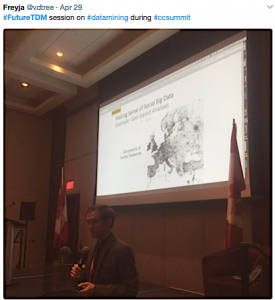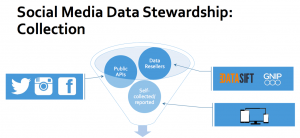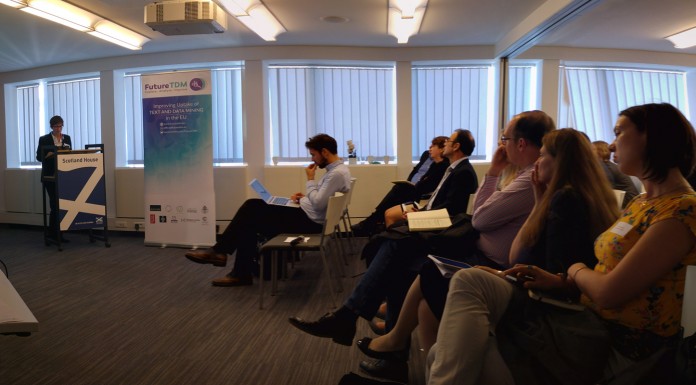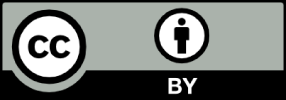We were very pleased that our FutureTDM session proposal was accepted for the 2017 Creative Commons Global Summit.
This years summit took place in April in Toronto bringing together a diverse group of global network affiliates, policymakers, national CC representatives and many others.
To “build a more equitable, accessible, and innovative world”
The Creative Commons is a movement encouraging knowledge sharing and creativity working towards a digital commons: a pool of content that can be copied, distributed, edited, remixed, and built upon, all within the boundaries of copyright law. At the core of CC’s work has been the development of a set of alternative copyright licenses.
CC licenses are relevant for TDM as they regulate the use of works such as academic papers and reports and images but also databases. Legal uncertainty about the status and use of data as well as license interoperability are important topics we have addressed within FutureTDM so we were very happy with this opportunity to present and discuss our research with the CC community.
The summit
This years Creative Commons Summit aimed to strengthen the movement’s current network and expand for a more vibrant, usable and collaborative, people centered Commons. The three goals for the Summit were to:
- Define sharing and the Commons for our generation
- Shift the focus to people, moving beyond licenses to enhance collaboration and sharing
- Discuss the future of the Creative Commons network and grow the CC movement
Over the three days there were few keynote presentations but many sessions on topics ranging from OER, Copyright reform, Open access advocacy and the state of the commons.
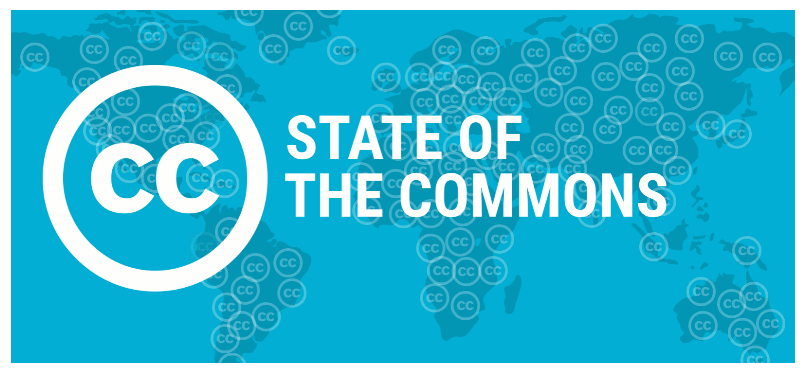
The State of the Commons report presented by Jane Park showcases the results of the annual CC data analysis on the commons global community.
From the report:
Creative Commons now counts 1,204,935,089 CC-licensed works (up from 1.1 billion in 2015). Of those, nearly 93 million are in the public domain. Sixty-five percent of works use a "free culture" license (these are CC0, CC BY, CC BY-SA, and other public domain tools), which allow remix and commercial uses.
Highlighted use cases include the Multimedia Commons Initiative, where teams of researchers around the world utilize Flickr’ 100 million image dataset to build new applications and explore people’s interaction with places.
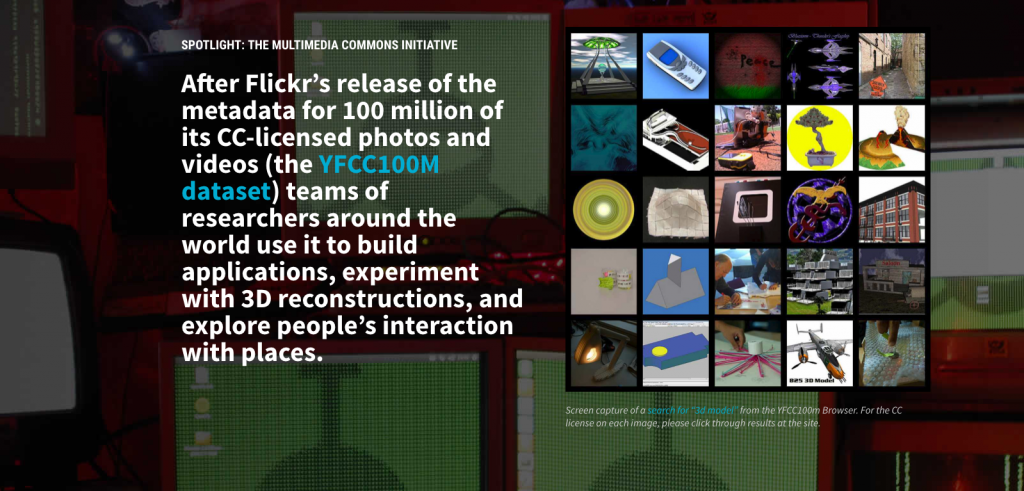
And the British Museum, which released 128 models of sculptures from the Roman and Egyptian periods on the 3D design sharing platform Sketchfab.
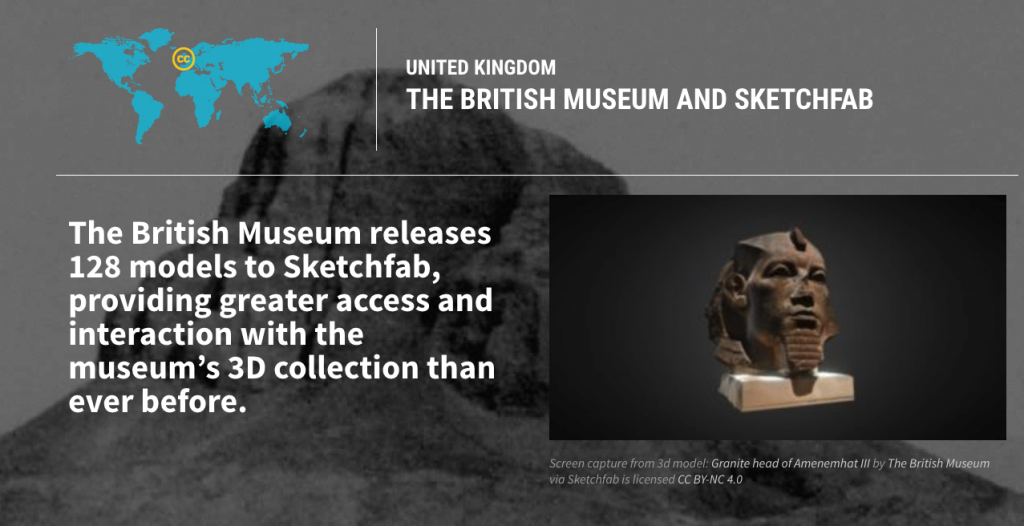
The report was translated by 30 volunteers into different languages as part of CC’s efforts to make the community more accessible to international communities.
The importance of inclusiveness and diversity could be seen and felt throughout the summit ranging from gender balanced panels and keynote speakers to sessions and lunch discussion on how to improve on inequality.
Also presented at the summit: the release of ‘made with creative commons’ book about sharing and open business models. Available online at https://creativecommons.org/made-with-cc/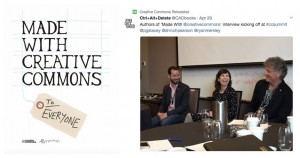
The following gives you a brief impression of the 3 inspiring days and topics we found interesting and relevant for our work on improving the uptake of TDM. For example the sessions on education confirmed our findings on the lack of education and skill and the need to raise more awareness but also to develop better tools and documentation on TDM.
To make sense of what problems we are facing and how we can contribute to reaching for example the UN sustainable development goals, TDM can help in providing insight and evidence based on data for policy.
FutureTDM and CC
FutureTDM organised a session on saturday morning to discuss TDM and the issues with licensing. We invited Associate Professor Anatoliy Gruzd to share his experiences with TDM as the Director, Social Media Lab at Ryerson University.
Anatoliy illustrated the research cycle from gathering data to publishing results with some of the projects they have been working on at Public Lab using social media data.
It was interesting to see how the barriers are the same for Canada as well as for the EU countries FutureTDM focuses on. Problems include the technical issues having to clean up unstructured data and getting access to data for TDM.
The need for more funding to be able to get the data needed for research and the problem not knowing what the licenses attached to the data allow when it comes to sharing and publishing results.
Timothy Vollmer of CC joined us presenting the different CC licenses and gave his reflection on the issues mentioned that pose a barrier for TDM.
After the presentations we opened the floor to the participants who asked some important questions about the clarity of the licenses used for TDM. The discussion also focussed on the expectations based on the upcoming copyright reform in the EU, and whether the exception to copyright currently in place in the UK and France has improved TDM. To illustrate the demand for TDM and lack of skills, one of the participants shared his experiences working as a University librarian in Toronto and the questions he receives from the researchers who want to undertake TDM but do not know how.
Insights
Some conclusions we can draw from the discussions that followed the session is that there is still a need for more awareness and better understanding of the licenses people use as well as how their choices impact TDM. For the licensing communities there is work to be done to not only provide more information on the licenses themselves but also how the existing licenses interoperate with each other. Combining data and datasets from different sources with different licenses attached is still one of the main barriers for TDM practitioners.
We look forward to more discussion on our findings and the recommendations we have and will continue to develop for the duration of our FutureTDM project.
If you are interested to learn more about the legal issues and other barriers we have identified, or would like to give feedback on the policy recommendations we are proposing for Europe please visit our website where you will find our research reports on many of the topics discussed. We would also love to speak with you in person so join us: the events we will be joining are on the website also.
Finally for coverage of events and news do sign up for our newsletter and follow us on Twitter @FutureTDM.
*All images Twitter Screenshots unless stated otherwise.
// All blog posts are the personal opinion of the bloggers. For more information see FutureTDM's DISCLAIMER on how we handle the blog. //




